Help! My Baby Won’t Sleep in Their Crib

- When your baby won’t sleep in their crib, it’s easy to blame yourself, or your baby. Don’t.
- A baby sleeping soundly in the crib is a beautiful image, but it doesn’t match reality for many parents. You are not alone.
- Don’t despair. There are many reasons your baby may struggle to sleep in the crib, and lots you can do to help you and your little one get the rest you need.
You want a good night’s sleep, and who can blame you? Caring for your baby is a full-time job.
Sleep is vital and when you’re not getting enough, it’s hard on you both.
Yet sleeping in a crib doesn’t come naturally to most babies. They’d rather be with you, and that makes sense. Our ancestors faced countless dangers and were easy pickings for a hungry predator. Modern life no longer presents the same risks, but your baby’s need to be with you remains.
However, that doesn’t mean you’re destined for a life of sleep deprivation. We want you to enjoy this time while you can, so let’s take a look at what might be going on.
Why Won’t My Baby Sleep in Their Crib?
Imagine being born. After months cocooned in an oasis of calm, your world is turned upside-down, and there’s a lot to get used to. Here are a few reasons your baby may not want to sleep in their crib.
Your Baby Wants to Be With You
Maybe you’ve heard the newborn phase described as the ‘fourth trimester’—a transition time for you and your baby as you learn to be parents and they adjust to life outside the womb.
Helpless and vulnerable, young infants need constant attention to survive and close connection in those early days is essential.
Frequent Waking Is Normal
Babies weren’t created to sleep for long periods. Their tiny tummies need filling frequently to get the nourishment they need. Waking often is also thought to be part of an infant’s survival instinct—totally normal and natural.
But maybe that’s not the whole story, especially if your baby was sleeping well in a crib and that’s changed.
What Else Might Be Going On?
- Are they too hot or too cold?
- Teething?
- Signs of illness? Seek medical attention if you’re worried your baby isn’t well.
- A growth spurt? Rapid brain development and physical growth may result in sleep regression.
- Have you had a particularly busy time lately?
- Has your routine changed?
- Or your baby is ready for a change?
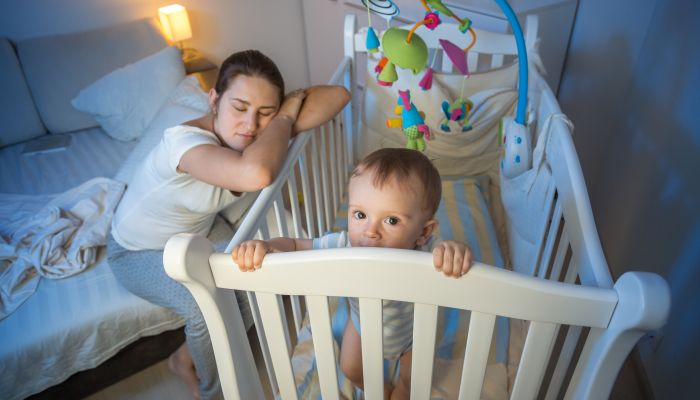
When Should My Baby Start Sleeping in Their Crib?
Your newborn can sleep in a crib, if that works for you both.
As for when they should… that’s a matter of choice. Some babies fall asleep in their own crib from a young age and others don’t find it so easy.
What matters most is that your baby has a safe and comfortable sleep environment and their needs are met.
Safe Sleep Recommendations
- Place your baby to sleep on their back
- On a firm mattress
- No loose blankets, pillows or soft toys before the age of 12 months.
- Keep your baby at a comfortable temperature.
- Avoid contact with smoking, alcohol and drugs.
The American Academy of Pediatrics recommends sleeping in the same room as your baby for the first year, or at a minimum the first six months.
Bed-sharing is common around the world and has been shown to pose no greater risk of harm than sleeping separately, and even offer benefits. It’s convenient for breastfeeding, offers precious bonding time and can help regulate your baby’s temperature and breathing.
Research indicates the dangers of bed-sharing are mostly associated with unplanned co-sleeping or specific risk factors such as smoking and alcohol. Whether you intend to co-sleep or not, it’s a good idea to make your own bed a safe sleeping space for your baby. Side-car cribs, aka bedside sleepers or bassinets can be attached to the side of your bed to increase the sleeping area.
10 Tips to Help Your Baby Sleep in Their Crib
- Wherever your baby sleeps, they need to feel comfortable and safe. If you want your baby to sleep in the crib, make the space as inviting as possible.
- For your child, the biggest draw is you. Keep their crib next to your bed, close enough so you can reach out and comfort them. Gentle touch and the reassurance of your presence mean a lot to your baby.
- Respond to your baby’s cries quickly and consistently. The more you do, the more your baby knows they can count on you.
- Help your baby associate the crib with pleasant experiences. Give them time to lay and play while you’re close by. Read, play soft music and chat quietly nearby.
- Younger babies may sleep better when they feel more enclosed. Place a portable bassinet inside the crib, try swaddling or a baby sleep sack.
- Melatonin, the hormone that promotes sleep, passes through the placenta and is present in breast milk. Breastfeed for as long as you can to take full advantage of this.
- Babies won’t produce their own melatonin for some time after birth. Help your younger baby learn the difference between day and night with a familiar bedtime routine. Once your baby is clean and fed, try:
- Low light
- Lullabies
- Stories
- Massage (using baby-safe lotions)
- Don’t worry if you don’t follow the same bedtime routine every night. Flexibility and a willingness to adapt are positive traits for you and your baby. Encourage them where you can.
- Some babies sleep better with blackout blinds, others with nightlights. Some with white noise, others with silence. See what works for your baby, but beware of creating conditions you can’t maintain. Let your baby get used to the normal noise and activity levels in your home, this makes life easier for the whole family.
- Look for sleep cues and feed or lay your child down when they’re falling asleep. An overtired baby may be much harder to settle. Sleep cues include:
- yawning and stretching
- touching their face
- Irritability and crying
- staring off in the distance/‘zoning out’
- Make plans ahead of time. Share the load with a partner or family member and agree who will wake up with your infant. Accept practical and emotional support.
- Go easy on yourself and your baby. Focus on connection and following your baby’s cues where you can. Your baby is growing and changing all the time and you’re learning together but the more you can live in harmony with your baby’s natural rhythm and preferences the more peaceful your life will be.
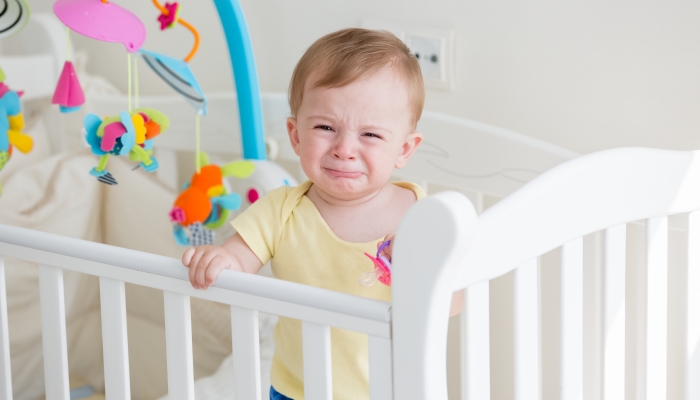
FAQs
Are daytime naps stopping my baby from falling asleep at night?
Newborn babies can sleep for up to 18 hours a day and daytime naps make up a substantial portion of this. As your baby gets older, they’ll sleep longer at night and daytime naps will naturally shorten.
Many parents find better sleep in the day equals better sleep at night. Some babies stop napping by 2 years old, others benefit from naps up to age 5 or 6 while still sleeping well through the night.
If you think your nap schedule may be interfering with your baby’s sleep, see whether adding, or dropping a nap helps your baby sleep better at night.
What if my baby falls asleep in the stroller, car seat or baby-carrier?
It’s fine for your baby to fall asleep in a bassinet stroller or car seat and it’s hard to prevent. A quick drive or walk around the neighborhood often results in a sleeping baby. Never leave your baby unattended or for long periods in a stroller or car seat.
Baby-wearing allows you to go about your day while meeting your baby’s need for comfort and security. This is a great option if your baby has a hard time settling to sleep. Don’t worry about laying down habits you won’t be able to break. The reality is that babies change all the time and you won’t be able to carry them forever. If it works now, embrace it.
Is it okay to nurse my baby to sleep?
Many babies fall asleep at the breast, it’s perfectly natural and a good sign your baby is receiving the nutrition and comfort they need. Breastfeeding releases hormones that help you and your baby feel sleepy and connected.
The World Health Organization recommends exclusive breastfeeding until your baby is 6 months old, continuing with solid food up to the age of 2 years old and beyond. Breastfeeding can reduce the risk of sudden infant death by as much as 50% in the first two months of life and provides numerous health and emotional benefits for you and your baby in the short and long term.
Once your baby falls asleep you can move them to a safe sleeping space. If your baby repeatedly wakes on moving, look for ways you can be the one to move away from them.
Should I try sleep training?
Not in the first four to six months, and even after that, sleep training can be controversial.
Sleep training covers a wide range of practices and some parents report good results. But whether sleep training enables your child to sleep better, or simply resigns them to stop calling out is up for debate. Either way, this might seem like a positive move forward but at what risk to your relationship?
There are concerns about the high levels of stress experienced by babies left to cry it out. Gentler approaches, like fading sleep training and the chair method can involve little or no crying.
How you respond to the challenges of your little one’s early life lays down foundations for relationships that last a lifetime. Focus on being kind to yourself and your baby. Sweet dreams.

Related Posts
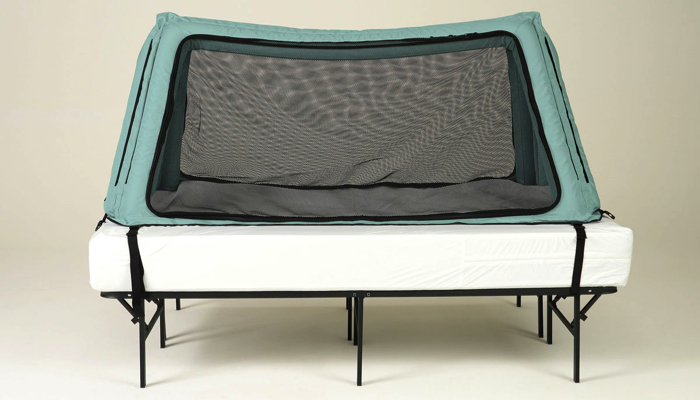
Sleep, Special Needs
Safe Place Bedding Travel Bed Review
Traveling with a special needs child can be stressful! Having a safe, durable, and easy to use travel bed can make traveling so much easier!
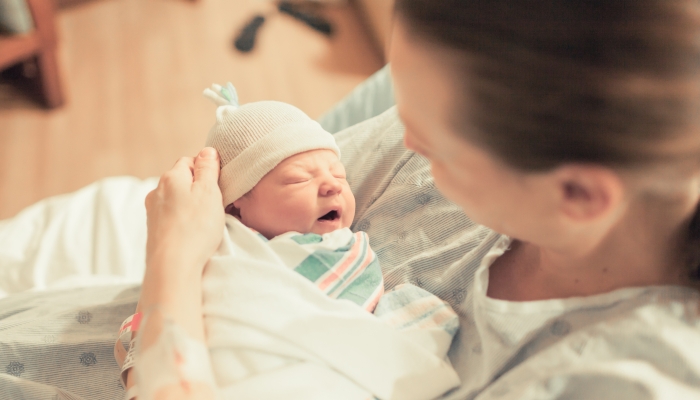
Sleep, Special Needs
Sleep Regimen for Premature Babies: Special Considerations
It can take premature babies much longer than their full-term peers to sleep for long stretches. A preemie sleep schedule may encourage better sleep.
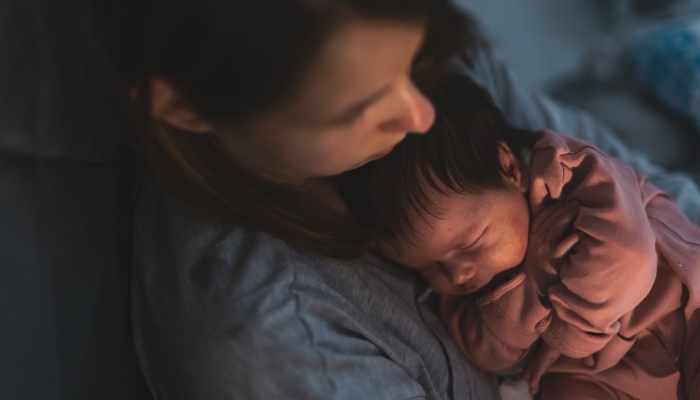
Sleep
Mastering the Bedtime Routine: 3 Tips for a Peaceful Night’s Sleep
From around six weeks, a newborn bedtime routine can help your baby learn the difference between day and night and prepare for a restful night’s sleep.